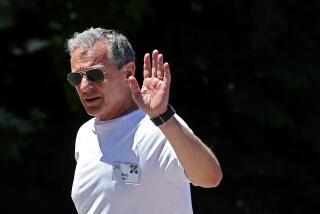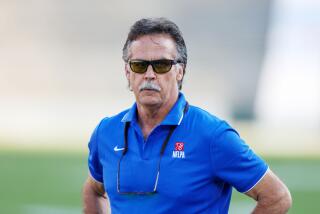Selig Is Penciled In at Top of Order
- Share via
Insisting he can operate in the best interest of the game and not strictly in the best interest of his fellow major league owners or Milwaukee Brewers, Bud Selig became baseball’s ninth commissioner Thursday by unanimous vote of the owners at a meeting in Chicago.
“If I can’t make the emotional shift [from owner to commissioner], then I should have had the decency to turn the job down,” Selig said.
“But I believe I can make that shift. I mean, people say, ‘Oh, but you’re an owner,’ but more than that I’m a fan who believes in the history, tradition and decency of the game.”
Selig, who will be 64 on July 30 and has been acting commissioner since Sept. 9, 1992, will receive a five-year contract at what sources said would be about $2.25 million per year, when terms are completed.
Although his appointment long has been anticipated, Selig called it an exciting and overwhelming day.
His voice occasionally cracked during a news conference in which he was accompanied by his wife, Sue, two daughters and four of five grandchildren.
He said the game was in the middle stages of a powerful recovery from the 1994 players’ strike and predicted a golden renaissance by the turn of the century, reiterating that there is no room for error or return of the acrimony and divisiveness that has characterized eight work stoppages.
“The fans don’t want to hear what I say or what [players’ union head] Don Fehr says,” Selig said. “They don’t want to hear about money. They want to focus on the field, as they have during the first half of this year. We can’t fall back into the behavior patterns of the last 30 years. We’re past a point where owners can attempt to force their wishes on the players. We have to work together to move the game forward.”
That may be an idyllic if elusive goal, but Selig pointed out that Paul Beeston, the former Toronto Blue Jay president who became baseball’s chief operating officer last year, already has forged an improving relationship with the union, which Fehr has acknowledged. In the new structure, Selig said, Beeston will handle much of the day-to-day business, while Selig will focus on the big picture, such as TV negotiations, revenue sharing, etc.
“He’ll do the work, I’ll do the second-guessing,” Selig said, laughing.
The initial agenda, he said, will focus on an agreement with the union regarding extension of interleague play beyond 1999; expanding the marketing staff and programs--nationally and internationally; implementing a second realignment to ease scheduling problems, and continuing an attempt to improve the pace of games.
The international thrust will be discussed in a meeting Wednesday in New York, with Beeston and Fehr meeting with eight owners to talk about a possible world cup tournament, player participation in the Olympics, global marketing and an international draft.
Of the new structure, New York Yankee owner George Steinbrenner said:
“The team of Selig and Beeston is the best thing to happen to baseball in 25 years.”
Selig said he will move out of his County Stadium office and into an office in downtown Milwaukee, but frequently will travel to the central office in New York. Wendy Selig-Prieb, his daughter and the club’s counsel, is expected to become team president. Selig said that Wendy and General Manager Sal Bando are probably happier with Thursday’s development than anyone because “I’ll be out of their hair now. Sal is probably drunk already.”
Selig, who already has been in office longer than the three most recent commissioners (Peter Ueberroth, the late Bart Giamatti and Fay Vincent), said four people were on his mind Thursday: his mother and father, the late Detroit Tiger owner John Fetzer, who was “my mentor and taught me more about life than anyone except my father,” and Giamatti, who shared his passion for the game.
Asked what had changed his mind after long denying his interest in becoming permanent commissioner, Selig cited the persistent lobbying of fellow owners, who kept telling him, “ ‘The game is on an upswing, you understand the problems, we can’t afford to begin with someone new again no matter how qualified they are.’ When I was convinced of their sincerity, I felt that I couldn’t let the game slip into a possibly long morass of wondering whether this candidate or that candidate could get enough votes. We have to continue moving forward. The opportunity is too great.”
More to Read
Go beyond the scoreboard
Get the latest on L.A.'s teams in the daily Sports Report newsletter.
You may occasionally receive promotional content from the Los Angeles Times.










